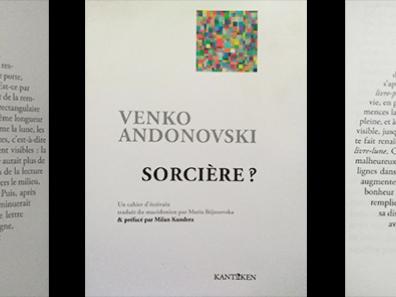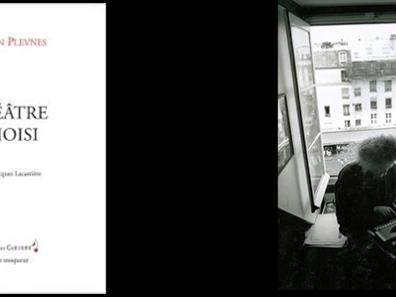The loneliness of writers in minority languages

Macedonia. Of all the pedestrians who pass around me on the street, how many know what that word means? One feels a kind of sadness when one thinks of the loneliness in which a great novelist from Macedonia must necessarily find himself. And even more so if that novelist has not written his novel with a view to selling it well, but so that it might say what had not yet been said. Such is the case with Venko Andonovski and his novel, Sorcière‽, which, moreover, is an overly modern novel, i.e., in my personal jargon, a novel of the third period... the third period in the history of the novel during which the novelist refuses to obey the traditional form of the novel as a necessity.
Milan Kundera, Preface, in Venko Andonovski, Sorcière‽ (Вештица), translated from the Macedonian by Maria Bejanovska, Kantoken, 2014.

As comparative literature has done very little to explore the Balkan area, writers from the Balkans, also known as Southeast Europe, among whom Macedonian writers rank, have had no real reception and remain very little studied, despite international renown, even Nobels prizes (Ivo Andrić, 1961). Can the reason for this state of the art be put down to a shortage of translations?
Certainly not, although there has been a marked increase in translations since 1989. Writers such as Miroslav Krleža, considered "a monster of Croatian and more broadly Central-Eastern European literature", whose six works were translated between 1954 and 1975, went virtually unnoticed. The non-reception of this author will be the subject of a post-graduate thesis[1]. The presence of foreign literature through translation is no guarantee of its reception.
For a long time, it was accepted - particularly in the case of minority-language literature - that a good knowledge of a foreign language combined with a good knowledge of French were sufficient to translate such literature. Knowledge of their histories and disciplinary training were not essential prerequisites. These sincerely enthusiastic and often militant translators, seen as "bridges" between cultures, practiced according to their affinities a selection of works and their domestication in their translation, depriving certain major works of visibility, and the lucky chosen ones of their originality. Sometimes, too, they rewrote or adapted them, as Milan Kundera stupefied for his own works. Prefaces, when they existed, usually compared the writer to a great name in literature, while emphasizing the absence of the very literary qualities that made the reference writer famous!
Does Balkan literature have specific narrative structures; do its literary devices and themes make it hermetic to contrastive analysis or to a translation respectful of its specificities? To answer this question, in 2006 we set up a research seminar on: "Balkan Writings[2]". In order to identify the characteristics of this literature and devise appropriate approaches, the major themes, previously identified, were studied:
1) History: writing historical discontinuity;
2) War and genocidal violence: testimonial writing;
3) Memory: writers building collective memory;
4) Writing dissidence;
5) Emigration/exile/cosmopolitanism: writing exile;
6) Polyglottism. Language and exile;
7) Western influences on the writings of writers from the "literary peripheries";
8) Orality: expression of the continuity of linguistic, cultural, religious and historical identity.
Passage from orality to writing. Survival of oral genres: poetry, theater. Circulation and influences between orality and writing.
This reflection aimed to confirm the existence of a new literary genre: the novel of "strangeness", a concept we had created and defined in 1995. A first collective work (Cahiers Balkaniques n°36-37) was published, and two others are in preparation. The approach we adopted, whose validity was proven, reinforced the idea of the existence of a vast, unexplored field of research, of undeniable interest; and also of the need to take into account a translation that respects the foreignness of the works. The students trained in this seminar mobilized their acquired knowledge and adopted innovative approaches in which literature and history are inextricably linked in their own research[3]. One of the students, Ornella Todorushi, inspired by this approach, had the idea of extending the reflection by creating the Salon du Livre des Balkans in 2010 and in 2014 wrote her thèse de doctorat sur "La réception de la littérature albanaise en France: de la vulgate réductrice à la réception créatrice (1970-2011)".
Thinking about Balkan writing involved all forms of creation. We also set up a partnership with the Festival des cinémas du Sud-Est-Européen, which celebrates its 10th edition this year. Similarly, we have co-founded a Summer Campus of Languages and Translations, Francophonie and Slavic Itineraries (L.E.T.F.I.S.) in partnership with the University of Poitiers.
Still, the loneliness of writers of literature in minority languages persists. A novel like Goce Smilevski, Сестрата на Зигмунд Фројд Freud's Sister, in French La Liste de Freud, which in 2010 won the European Prize for Literature and the Prize for Mediterranean Culture, translated into over thirty languages, even before it can be studied from a literary point of view, is subject to virulent political criticism from psychoanalysts who are "defenders of Freudism". This young Macedonian novelist had the audacity to deal with themes that were too European and contemporary, forgetting that he should limit himself to the exoticism of his origins, or to his status as homo politicus from that authoritarian "East", that barbaric "Orient". So alone in his approach, he didn't even have the right to reply.[4]
Goran Stefanovski, a Macedonian playwright, had a similar experience. Preparing a speech for the Hamburg International Festival and pondering its title, he was asked by his friends, "Why isn't the East sexy anymore?" Feeling attacked by this proposition, he began to question the meaning attributed by Westerners to the word "sexy" when used to describe Eastern Europeans. This questioning led him to write a text on the former Yugoslavia and the countries of Eastern Europe, in which he attempts to establish the differences between the mythology of the East and that of the West, between two fundamental narratives. First published in French in Alternatives théâtrales no. 64: "L'Est désorienté. Espoirs et contradictions", it would later appear, along with his play Hôtel Europa[5], under the title: "Fables du monde sauvage de l'Est. When were we sexy?" Translated into many languages, it enjoyed great popularity.
Kundera in L'Art du roman, argued that the novel is the work of Europe. And if the discoveries in this field were made in different languages, they belong to Europe. The value of a work can only be fully assessed and understood in this supranational context. However, for writers from southeastern Europe, the consecration of their work is always subject to their recognition by the center of European literature: France, that "world republic of letters" and Paris the "Greenwich meridian of literature" (Pascale Casanova, 1999), even if this center is tending to shift towards the United States.
Thus, many French works have been translated so that the canons of French literature serve as a model. Georgji Choptrajanov (Choptrayanovitch) rescued Étienne Tabourot (Étienne Tabourot was a French poet, born in Dijon in 1547 and died in 1590) from oblivion by writing a monograph based on his doctoral thesis written in French and defended in France (Belvet 1935 and Slatkine 1970). Author of essays in French on Montaigne, Roman Rolland and Voltaire, and of a French grammar in Serbo-Croatian and Macedonian, he was the first translator of literary works from French into Macedonian. He created the first Chair of Romance Philology in Skopje, contributing to the circulation of French thought and literature in Southeastern Europe[6].
In La République mondiale des Lettres, Pascale Casanova, speaking of writers from regions far removed from literary capitals, stresses the need for them to take the "measure of literary time", which distinguishes between real and fictitious time, or central and eccentric time. Real time is characterized by the unification of the political, the historical and the artistic. It relegates other temporalities (national, family, intimate...) to the outside world. Once the measure of this time has been taken, the writer who wants to inscribe himself in it by creating a work of the "present" is obliged to go in search of it, to bring it back to his country. As Casanova puts it, this quest is "the exit from the 'fictitious time' devolved to the national space and the entry into international competition. Writers who limit themselves to national temporality, and who therefore consider only the national norms and limits assigned to literary practices, are unaware of this real time referring to international laws, nor of its most contemporary creations resulting from aesthetic revolutions. As a result, it is impossible for them to know the novel, which as a genre explores all the possibilities of being in its contemporaneity.
But is it enough to take the measure of a "real time" to be able to integrate into it? Literary capitals reduce writers from the periphery to homo politicus, journalists of opinion, dissidents or mere crucibles of exoticism (Danilo Kiš, Homo poeticus, 1993). Who, as long as they live in a totalitarian regime, denounce it or wage war, are "sexy". Is European literature, centered on itself and functioning as a universal model, able to see or receive a world-literature that explores the same themes and sometimes the same narrative structures, even if written in French?
Many of these writers found that their cultures and literary histories were unknown to the French reader and writer, even though they themselves knew French culture perfectly well and lived with it, being bicultural, bilingual, even polyglot. Marked by this specificity, Southeast European writers oscillated between an inferiority complex and a superiority complex, which would be reflected in their works, described as "difficult to follow", "difficult to classify" and "not corresponding to the horizon of Western expectations". They themselves were only writers with an adjective: "Macedonian writer", here reduced to a minority origin, "any adjective added to the noun 'writer' weakens its meaning in principle, reduces it. I did not want, and still do not want, to be the writer of a minority, whatever that may be. [...] I detest books about minorities, which often embody, in my opinion, the triumph of sectarianism, an alibi for these minorities, which gives them an extra-literary character and ensures them a public reception that has nothing to do with literature." (Kiš, 1993) Yet their wish is to be recognized as writers.
Like the experience of the philosophers of the magazine Praxis who at the turn of the 1960s founded the Summer School on the island of Korcula in Dalmatia, where they dialogued with Ernst Bloch, Herbert Marcuse, Erich Fromm, Jürgen Habermas, Lucien Goldmann, Pierre Naville, Henri Lefebvre, Kostas Axelos, the International Poetry Festival in Struga: Les Soirées Poétiques de Struga (Струшки вечери на поезијата), created in 1962, is a unique experience that enables the meeting and collaboration of poets from around the world with a shared concern to contribute in real time to poetic creation. Hence the first and most numerous translations of Macedonian writers precisely in the field of poetry. The fortunate initiative of Maison d'Europe et d'Orient and Eurodram has led to the discovery of "all too modern" theatrical writing, notably by Dejan Dukovski, Žanina Mirčevska, Jordan Plevneš; authors whom the theater is delighted to have known for their undeniable contribution to this art.
"I wanted us to hear the voices of creators who came from this other Europe, the one we learn little about in our schools. It's a Europe of which we in the "West" have a sorely partial idea, and which has undergone major upheavals in recent decades. The months I spent with this writing and these preoccupations left a deep impression on me. My encounter with Dukovski's work, and with the man himself, would not have been possible without the advice, knowledge and support of Dominique Dolmieu and the team at the Maison d'Europe et d'Orient. I can't thank them enough." (Stuart Seide, preface to Baril de Poudre by Dejan Dukovski, 2020).
These places for artistic encounters and exchanges are spaces for the co-construction of cultural Europe, which has been divided for too long.
Frosa Pejoska-Bouchereau
Professor of Macedonian language, literature and civilization

[1] Danica RAJIĆ, "Le problème de la réception de Miroslav Krleža en France", edited by Professors François De Labriolle and Janine Matillon-Lasić, Université Paris III - Inalco, 1986. Manès Sperber (former literary director at Calmann-Lévy), in an interview published in NIN on February 7, 1982, expressed regrets similar to those of Kundera:
"I have read Krleža both in German and English translation. Sometimes I reflect on what Krleža might have been like if he'd written in one of the world's great languages; how many readers would he have had? Maybe it's not tragic, but it's often sad to see that a writer of his stature, in my opinion one of the five greatest writers of this century, has so few readers outside his own country." (in D. Rajić)
[2] From 2006 to 2011, 169 talks were given by 62 students, 85 lecturers and researchers, 15 writers and artists and 7 publishers. These lectures covered 19 linguistic fields (Albanian 21, Armenian 1, Belarusian 1, Bosnian 5, Bulgarian 12, Cypriot 6, Croatian 6, Greek 39, Judeo-Spanish 1, Macedonian 15, Romanian 4, Rromani 5, Russian 2, Serbian 18, Slovenian 7, Sorbian 3, Turkish 2, Ukrainian 6, transversal 15) and 3 disciplinary fields (literatures 151; linguistics 3; civilizations 15).
[3] Notably Christina Alexopoulos, Igor Fiatti, Michèle Justrabo, Alexandre Lapierre, Évelyne Noygues, Nicolas Pitsos.
[4] Cf. https://static.mediapart.fr/files/Goce_Smilevski_reponse_a_Elisabeth_Roudinesco.pdf.
[5] Editions L'Espace d'un instant, translated from English by Séverine Magois, Paris, 2005.
[6] Chevalier and Officer of the Legion of Honor (France, 1976), described as one of the greatest French-speaking Macedonians, internationally renowned scientist, Doctor honoris causa of Clermont-Ferrand, Paris, Besançon, Franche-Comté. He was a friend of Louis Aragon, Claude Aveline, Henri Barbusse, Ferdinand Brunot, Paul Éluard, André Malraux, Roger Martin du Gars, Gaston Roupnel, Elsa Triolet, Tristan Tzara
.